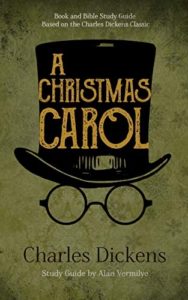>
In Stave II, when Ebeneezer Scrooge visits the school of his past and encounters himself as a lonely boy, comforted only by reading, something extraordinary happens — more extraordinary than three ghosts.
Suddenly a man, in foreign garments, wonderfully real and distinct to look at, stood outside the window, with an ax stuck in his belt, and leading by the brindle an ass laden with wood.
‘Why, it’s Ali Baba!’ Scrooge exclaimed in ecstasy, ‘It’s dear old honest Ali Baba! Yes, yes I know! One Christmas time, when yonder solitary child was left here all alone, he did come, for the first time, just like that. Poor boy!’”
As in the character from “Ali Baba and the Forty Thieves” one of Scheherazade’s tales from Arabian Nights, or The Thousand and One Nights. A storybook person, come in the flesh.
But wait! There’s more from a French fairytale.
‘And Valentine,’ said Scrooge, ‘ and his wild brother Orson; there they go!’”
And more tales from Scheherazade.
‘And what’s his name, who was put down in his drawers, asleep, at the Gate of Damascus; don’t you see him?’
[…]
‘And the Sultan’s Groom turned upside down by the Genii; there he is upon his head! Serve him right! I’m glad of it. What business had he to be married to the Princess?’”
And back to England and Daniel Defoe’s Robinson Crusoe.
‘There’s the Parrot!’ cried Scrooge. ‘Green body and yellow tail, with a thing like a lettuce growing out of the top of his head; there he is! Poor Robin Crusoe, he called him when he came home again, after sailing round the island. Poor Robin Crusoe, where have you been, Robin Crusoe? The man thought he was dreaming, but he wasn’t. It was the Parrot, you know.’”
Do you see what happened? Scrooge’s favorite characters actually came to life while he read when he was a boy. And so when he goes back to Christmas past, those characters are as real as his old classmates.
This is why we read. To have characters speak to us. To have their images as clear in our minds as our loved ones. This might be called reading generously.
Over 2020, our monthly reading roundup has been guided by a search for wisdom. Poet William Stafford has been our guide with A Ritual to Read to Each Other. Even though the poem talks about an elephant parade, it has a way of being the light in the darkness around us. It gives clarity.
But clarity and wisdom sometimes only get us so far. We can know what to do and still not want to do it. How do we keep from becoming a “A squeezing, wrenching, grasping, scraping, clutching, covetous, old sinner” like Ebeneezer Scrooge? How do we get from that mizer to a man who says, “I am as light as a feather, I am as happy as an angel, I am as merry as a schoolboy. I am as giddy as a drunken man”?
Read generously.
Tweetspeak Poetry’s 2021 theme is Generous, and this column will become Reading Generously. We’ll spend the next twelve months exploring what that means.
Part of what that means for me is rereading books like A Christmas Carol. It’s a way to admit I haven’t absorbed all the book has to offer. Ali Baba was always there, but I never noticed him until now, probably because a book podcast I love is reading those thousand and one stories. Each year as a reread this story I get to watch Scrooge come alive. He became generous with others because he first became generous with himself — the lonely little boy who found friends in books:
Some people laughed to see the alteration in him, but he let them laugh, and little heeded them, […] His own heart laughed, and that was quite enough for him.”
November’s Pages
Poetry
A Child’s Garden of Verses, Robert Louis Stevenson (his poetry came up in both Peace Like a River, read last month, and The Magician’s Book, this month)
Picture Books and Early Readers
Girl Versus Squirrel, Haley Barrett, illus. Renee Andriani
One Morning in Maine, Robert McClosky
All the World, Liz Garton Scanlon, illus. Marla Frazee (Re-read after taking an online class with the author)
Middle Grade and YA
The Boy, the Boat, and the Beast, Samantha M. Clark (Writers’ League of Texas recently did an online workshop with her)
Dry, by Neal Shusterman and Jarrod Shusterman (a climate change thriller)
Grownups
Northanger Abbey, Jane Austen (in which Catherine discovers she is in a Jane Austen novel, not Jane Eyre)
Little Black Sheep: A Memoir, Ashley Cleveland
A Christmas Carol, Charles Dickens
Transcendent Kingdom, Yaa Gyasi
The Magician’s Book: A Skeptic’s Adventures in Narnia, Laura Miller
Made Progress
How We Fight for Our Lives: A Memoir, Saeed Jones (also a poet!)
For Discussion
1. Have you ever actually read A Christmas Carol? If not, make it your December resolution. Then watch the Muppet version and be amazed how much they got right.
2. What fictional characters seemed real to you as a child? Or as an adult? (This is a judgment-free zone.)
3. Share your November pages. Sliced, started, and abandoned are all fair game.
Photo by Jonathan Kos-Read, Creative Commons, via Flickr. Post by Megan Willome.
Browse more from A Ritual to Read to Each Other
“Megan Willome’s The Joy of Poetry is not a long book, but it took me longer to read than I expected, because I kept stopping to savor poems and passages, to make note of books mentioned, and to compare Willome’s journey into poetry to my own. The book is many things. An unpretentious, funny, and poignant memoir. A defense of poetry, a response to literature that has touched her life, and a manual on how to write poetry. It’s also the story of a daughter who loses her mother to cancer. The author links these things into a narrative much like that of a novel. I loved this book. As soon as I finished, I began reading it again.”
—David Lee Garrison, author of Playing Bach in the D. C. Metro
- Perspective: The Two, The Only: Calvin and Hobbes - December 16, 2022
- Children’s Book Club: A Very Haunted Christmas - December 9, 2022
- By Heart: ‘The night is darkening round me’ by Emily Brontë - December 2, 2022


Glynn says
I’ve read “A Christmas Carol” about eight times, and I think you’ve convinced me to read it again this year. And I love the Muppets version. Many people watch / re-watch “It’s a Wonderful Life” at Christmas Time; I watch “Scrooge,” with Albert Finney. And yes, I sing along with all the musical’s songs.
Read in November:
Mystery
The Adventure of the Beryl Anarchists by Craig Stephen Copeland
The Hope That Kills by Ed James
Where Every Man by Charlie Garratt
Small Town, Next Lover, and The Wrong House to Burgle by Glenn McGoldrick
Prove It: Murder in the Mix by Hannah Kurz
Interviewing the Dead by David Field
Should Grace Fail by Priscilla Paton
Miz Scarlet and the Holiday Houseguests by Sara Barton
Fiction
The Magnificent Dappled Sea by David Biro
A Baby’s Right to Choose by David Winters
Poetry:
Wonder & Wrath by A.M. Juster
Hearts on Pilgrimage by Jody Lee Crosby
Mania by Arran James Grant
Spirits in Bondage: A Cycle of Lyrics by C.S. Lewis
A Spring Harvest by Geoffrey Bache Smith
Non-fiction
The Mystery of Charles Dickens by A.N. Wilson
How to Think Like Shakespeare by Scott Newstok
Romance
Love Me Timeless by Melissa Crosby
Hoping for Hawthorne by Tara Grace Ericson
Megan Willome says
Glynn, how was the Charles Dickens book?
Glynn says
It was ok, Megan. I’m not a big fan of psycho-biography, and that’s a lot of what this one is.
L.L. Barkat says
Oh, you’ve inspired me, Megan!
I love your choice for the new reading column. And I love the first deep observation, via Scrooge’s character: “He became generous with others because he first became generous with himself.” That is some line to unpack. After all, being generous with oneself is far different from being selfish, yet the two might be hard to discern as different from one another on the surface.
Now I am thinking, too, that the girls and I should take your challenge. This year has been so very hard on too many levels to count, including having to face Christmas for the first time without grandma. So I’m looking for things to focus on, to craft at least some kind of ritual to get us through and deepen our sense of life and living, despite the challenges of the year.
Megan Willome says
First Christmases without a loved one are hard and do require new rituals.
We all need a little generosity with ourselves after this year.